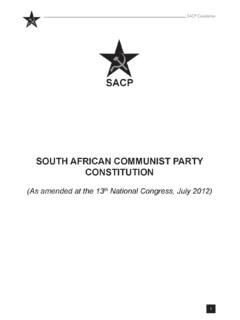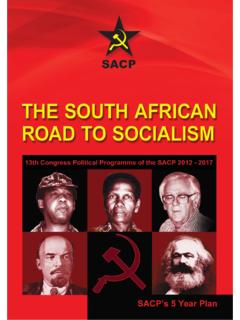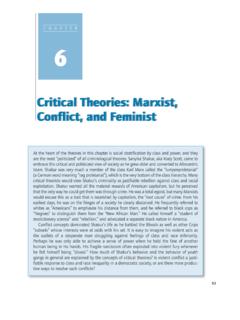Transcription of 14th National Congress - South African Communist Party
1 1 14th National CongressDiscussion Documents and Position Papers10-15 July 2017 Defend , Advance, Deepen the National Democratic Revolution: the vanguard Role of the SACPSACPD iscussion Documents and Position Papers2 Defend , Advance, Deepen the National Democratic Revolution: the vanguard Role of the SACPSACP3 Discussion Documents and Position PapersSACPD efend , Advance, Deepen the National Democratic Revolution: the vanguard Role of the SACPCONTENTS Page1. Going to the root ..52. Radical Economic Transformation in the interests of all, but primarily the poor ..373. What do we mean by the second radical phase of the NDR and within it radical economic transformation?
2 414. Now more than ever: The SACP has a leadership duty in the NDR ..635. The Party and State Power ..796. The State, the SACP and the balance of forces ..917. Our Strategic Tasks: Now and Over the Next Ten Years ..1018. The Inseparable Connection: The woman question, class struggle and the Roll back inequality in access to water and sanitation ..14910. Transformation of the Media. It s time for a Strengthen the vanguard Character of the SACP ..17512. CONSTITUTION ..19913. Proposed Constitutional Amendments ..215 Discussion Documents and Position Papers4 Defend , Advance, Deepen the National Democratic Revolution: the vanguard Role of the SACPSACP5 Discussion Documents and Position PapersSACPD efend , Advance, Deepen the National Democratic Revolution: the vanguard Role of the SACP1 GOING TO THE ROOT A radical second phase of the National Democratic Revolution its context, content, and our strategic tasks( To be radical is to grasp the root of the matter.)
3 Karl Marx, Dec 1843-Jan 1844; A Contribution to the Critique of Hegel s Philosophy of Right: Introduction (Emphasis added))SA s triple crisis - the immediate context of the call for a second radical phase of the NDRTwo decades beyond the critical 1994 democratic breakthrough our society remains afflicted with crisis levels of unemployment, inequality and poverty. This triple crisis has some cyclical features, reflecting the impact, for instance, of the 2008 global crisis on our own economy. But even during periods of relatively strong domestic growth in the late 1990s and early 2000s, crisis levels of unemployment, inequality and poverty persisted.
4 Our core social and economic challenges are clearly deep-rooted and systemic - rather than the result of a temporary downturn. This means that our response cannot just be a question of waiting for, or seeking to stimulate an upturn in growth along the same path-dependent direction as in the was in this context that the necessity for a radical second phase of the NDR was debated and endorsed at the ANC s National Policy Conference (June 2012) and formally adopted at the ANC s Mangaung 53rd National Conference (December 2012). The resolutions of the Alliance Summit sought to give further content to the concept. The call for a second radical phase was also the overarching theme of President Zuma s 2014 inauguration triple crisis is reflected in rising popular discontent, a growing sense of alienation, frustration and sometimes despair amongst significant strata of the youth, the unemployed, the working poor, those in informal settlements, and the so-called black middle class (most of whom are working class professionals or self-employed and often struggling petty entrepreneurs).
5 In short, the triple crisis is being felt acutely across a broad spectrum of the waged and unwaged popular strata. The unprecedented numbers of so-called township service delivery protests , and the lengthy and violent platinum belt strike are further symptoms of the impact of this crisis. Notwithstanding the ANC s impressive May 2014 electoral majority, it is critical that we recognise there is a popular, but for the moment largely amorphous, groundswell of frustration - much of it currently beyond the reach of the ANC-alliance s organisational and ideological is the immediate context of the call for a second radical phase of the NDR as a programme that strategically combines state power and popular activism.
6 But this call (this narrative about the way forward) is not the only narrative competing for hegemony in the current reality. Indeed, the perspective of a second radical phase of the NDR remains undeveloped. It is often poorly or confusingly explained, and other competing perspectives often enjoy greater prominence in the media and broader public domain. This present intervention seeks to contribute to a collective discussion on the meaning, content and context of a second radical phase of the Documents and Position Papers6 Defend , Advance, Deepen the National Democratic Revolution: the vanguard Role of the SACPSACPWhy do we speak of a SECOND radical phase of the NDR?
7 The ANC National Policy Conference correctly clarified that we are not speaking about a second stage . Implicit in this clarification is the recognition that we are not advocating a break with the current constitutional dispensation (or with a supposedly illegitimate government requiring regime change) of the kind that the EFF and others appear to be flirting with. But nor are we advocating for a back to business as usual. Rather, we are underlining the imperative of a new phase in an ongoing National democratic transition. This means that, if we are to give content and context to a second phase, we need also to characterise the main content and limitations of the first phase.
8 So what was the first phase of the NDR? The first phase was essentially played out on the political and juridical terrain. It had as its critical moments: the 1991-1994 multi- Party negotiations that finally compelled agreement (largely forced through mass mobilisation) that a future constitution could only be drawn up by a democratically elected Constituent Assembly; the 1994 democratic electoral breakthrough itself; and the consequent 1996 adoption of a new constitution. These processes were then consolidated in a wide-range of laws, democratic institutions, and the de-racialisation of the administrative apparatus of the state.
9 It is important to assert that the first phase was itself radical. It abolished (politically, juridically, constitutionally) white minority to the active role that the organized working class had played in the defeat of the apartheid regime, there were many important legislative and institutional gains made by the working class after 1994. The explicit entrenchment of worker rights in the Constitution, a range of progressive labour laws including the Labour Relations Act and the Basic Conditions of Employment Act, and the institutionalization of first phase has also been the platform on which a massive socio-economic REDISTRIBUTIVE programme has been launchedOver the past 20 years, the democratic breakthrough of the mid-1990s has been used by four successive ANC-led administrations to drive major REDISTRIBUTIVE socio-economic programmes.
10 Among the notable achievements have been: More than 16 million (nearly one-third of all South Africans) are now benefiting from a range of social grants up from 3 million in 1994; Over 7 million new household electricity connections have been made since 1996. (To put this achievement into context - in the preceding century, successive white minority regimes only electrified 5 million households!); Over 3,3 million free houses have been built, benefiting more than 16 million people; More than 1,4 million students have benefited from the National Student Financial Aid Scheme; Over 9 million learners in 20,000 schools receive daily meals.










